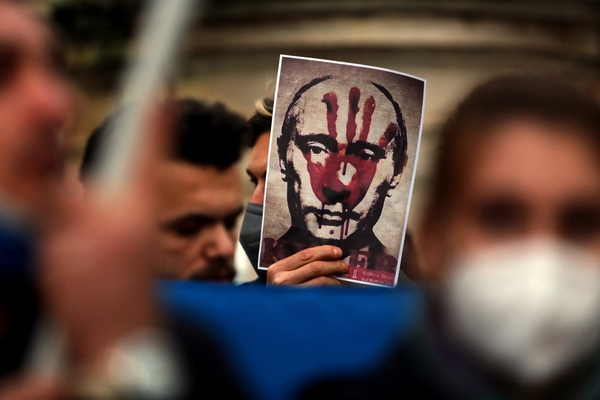Russia is slaughtering innocent Ukrainians, and BDS wants to stop nations from buying their fuel from Israel, an alternative to the genocidal regime in Moscow.
By Pesach Benson, United With Israel
Israel, Egypt and the European Union recently signed a memorandum of understanding to provide Europe with natural gas.
Israel has gas sitting offshore but not the means to deliver it. Europe wants to reduce its dependency on Russian fuel. Egypt has the infrastructure to deliver the gas and badly needs to boost its economy.
If ever there was a three-way win-win-win situation leaving everyone happy, the tripartite agreement, signed in Cairo on Wednesday, ought to be that.
Israel will now be able to pump raw natural gas to processing facilities in Egypt via a pipeline originally built to bring Egyptian natural gas to Israel. Once liquefied and pressurized, the natural gas will be shipped to Europe on Egypt’s LNG (liquified natural gas) ships.
The memorandum of understanding is not legally binding, but the arrangement it sketches out says gas sales will continue at least through 2030. Israeli gas deliveries would begin under the terms of an agreement that remains to be finalized.
But the memorandum of understanding is causing some grumblings in the Boycott, Divestment and Sanctions campaign against Israel (BDS) and from Ireland’s leading opposition party, Sinn Fein.
Responding to the memorandum of understanding, the BDS movement tweeted, “The EU is outrageously hypocritical. To punish Russia over its illegal, months-long invasion of Ukraine, the EU is replacing Russian gas by, among others, gas from Israel despite its decades-old apartheid regime against Palestinians.”
A follow-up BDS tweet insisted that “Apartheid Israel’s actual gas reserves and production volume are relatively small when compared to ten other states in the Middle East and North Africa. Much of Israel’s claimed gas is stolen or disputed. Why is the EU treating Israel as if it were a reliable energy giant?”
Meanwhile, in Ireland, Sinn Fein’s spokesman on foreign affairs and defense, parliamentarian John Brady, skewed basic facts.
“I am concerned that as the EU seeks to find alternative sources to Russian energy supplies that they are prepared to do a deal with Israel – a state that has been consistently found to be in breach of international law,” Brady sniffed.
Before cutting to the chase, the statement referenced Shireen Abu Akleh as “the US Palestinian Journalist gunned down by Israeli forces last month,” and cited three Palestinians “gunned down by Israel on Thursday.”
Until the Palestinian Authority makes the bullet that killed Abu Akleh available to Israeli investigators, the world will never know who fired the shot.
As for the three Palestinians “gunned down by Israel on Thursday,” Sinn Fein didn’t bother mentioning that they were killed in a shootout with IDF forces in Jenin. Hamas claimed Baraa Lahlouh was one of its members while Laith Abu Srour and Yousef Salah were apparently members of Palestinian Islamic Jihad. And just to clear away any doubts, after the shootout, Palestinian media featured photos of the trio posing with rifles.
Hot Air on the Gas Deal
The statement then goes to list more inaccurate objections to the agreement.
The statement noted a proposed pipeline requiring seven years to build before any gas reached Europe and which the U.S. objects to as too expensive.
Sinn Fein was referring to the EastMed pipeline, an ambitious project by Israel, Cyprus and Greece to lay a new pipeline across the Mediterranean. The initiative was undercut when the Biden administration dropped U.S support in January, calling it politically “destabilizing” and questioning its economic and environmental viability.
Egypt was not a party to the EastMed project. Although Cyprus and Greece are members of the EU, neither is a party to the memorandum of understanding.
“What is not being addressed is the denial of the Palestinian people to the mineral rights which have been discovered on Palestinian territories, but which continue to be appropriated by the Israeli state,” the statement adds.
That’s a reference to a gas field 36 km off the coast of Gaza called the Gaza Marine field. This field is thought to hold 32 billion cubic meters of gas, enough to power the Palestinian Authority and still leave some surplus to export.
Royal Dutch Shell held the rights to exploit gas from Gaza Marine, but ran into headaches dealing with the Palestinian Authority in Ramallah and Gaza’s de facto Hamas rulers.
At various points, Shell sought to sell gas to the Israel Electric Corporation and Jordan. The IEC balked out of concern that its money would ultimately wind up going to Hamas, while the Jordanians preferred dealing with Israelis over Palestinians.
So in 2018, Shell relinquished its rights. Gaza Marine remains undeveloped.
In addition to memorandum of understanding, Turkey is courting Israeli cooperation on further gas sales to Europe.
So what to make of BDS silence on Turkish, Egyptian and Jordanian energy dealings with Israel?
“Ireland has a responsibility to draw attention to this hypocrisy at an international level. The EU has a responsibility to avoid rewarding states in breach of international law,” Sinn Fein insisted.
“It must act consistently with the principles which define the EU. The EU cannot be seen to reward states which are consistently in breach of international law, through their blatant contravention of human rights.”
It almost sounds like they’re lumping democratic Israel together with the genocidal, autocratic Russian regime.
If that’s the moral equivalence BDS and Sinn Fein want to draw, why don’t they abandon their snobbish conceit and just continue purchasing Russian gas?
